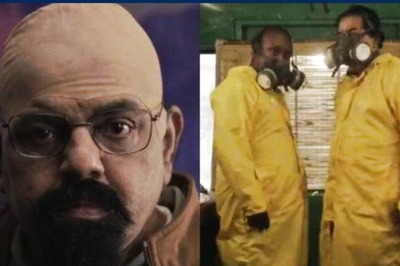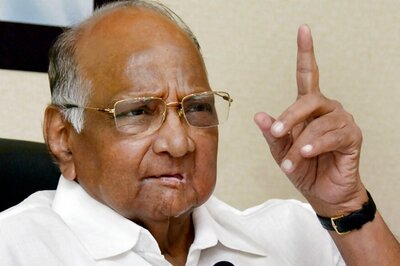OPINION | Iftar Parties & Identity Politics: How a Feature Typical of UP Power Play Was Tossed Aside

views
Lucknow: The holy month of Ramzan this year coincided with the long-drawn Lok Sabha election schedule spread in seven phases and 40 days, passed without any political party holding the Roza Iftar parties in Lucknow and other major cities of the state. Only UP Governor Ram Naik hosted an Iftar event at Raj Bhawan on June 3, a tradition observed for the last five decades.
The recently concluded general elections was marked by high-pitched campaign by Prime Minister Narendra Modi who besides tearing into his political opponents presented a report card of his government in his electoral speeches as he simultaneously outlined his vision for the future of India.
Uttar Pradesh has witnessed this political ‘ritual’ during Ramzan ever since late Hemvati Nandan Bahuguna introduced it in the political circles as state’s chief minister in 1974.
Bahuguna’s initiative became a tradition over the years and most of the state’s and central leaders, including late Prime Minister Indira Gandhi, began hosting Iftar parties. Successive chief ministers, including Samajwadi Party president Akhilesh Yadav, SP patriarch Mulayam Singh Yadav, former UP CM and present Rajasthan Governor Kalyan Singh and Union Defence Minister Rajnath Singh continued the tradition at their official residence.
As state chief minister, BSP chief Mayawati too had hosted ‘iftar’ but at a five-star hotel in the state capital. Late Ram Prakash Gupta was probably the only exception.
In 2017, chief minister Yogi Adityanath, however, decided not to host any such party. Adityanath also stayed away from the Iftar party that governor Ram Naik had hosted at Raj Bhawan.
As Mahant of Gorakhnath temple, Yogi has organised “Kanya Poojan” during Navratri but stayed away from hosting Iftars. Prime Minister Narendra Modi too did not host Iftar though his predecessors Manmohan Singh and Atal Bihari Bajpai had hosted such parties. So far the BJP ministers too have also stayed away from hosting Iftar parties.
The tradition started by Hemvati Nandan Bahuguna later became the scriptural foundation of the Muslim community. With the advent of the Mandal, Mandir and Dalit political forces, the politics became more and more competitive and secular political parties vied with each other for capturing the Muslims vote bank. Thus, holding Iftar parties during the month of Ramzan became an all-India affair and became an integral part of the Indian polity.
But then sudden indifference crept in and secular political parties began to shun the decades-old tradition, which was an easy way of reaching out to the minority community. This was perhaps the reason why Iftar parties hosted by Bihar chief minister Nitish Kumar and West Bengal chief minister Mamata Banerjee hit the national headlines.
The segregational politics on the grounds of caste and communalism has characterised the post-Nehru politics in India. The political parties were at ease by freezing the electorate on caste and communal mould which later led to the creation of special category of voters — Dalits, Muslims and OBCs, where these groups were made to believe that they had a special status in Indian citizenry.
If the above three are social groups, accounting for nearly two third of Indian electorate who have special status, then who is the common citizen?
The campaign against the politics and dynastic entitlements began to be symbolised by the terms like — 'Lutyens Delhi' and 'Khan Market gang' in Delhi. The campaign of 'Naamdar vs Kaamdar', spearheaded by Prime Minister Narendra Modi during the just-concluded parliamentary election campaign, has brought this paradigm shift in Indian politics where nobody has a special status and nobody has any privilege and entitlements on the grounds of caste and religion.
This campaign had begun in the run up to 2014 Lok Sabha elections with the slogan 'Sab Ka Saath, Sabka Vikas', and now has one top up 'Sabka Vishwas'.
Narendra Modi delivered the message loud and clear that the benefit of the welfare schemes like the LPG connection, electricity connection, toilets, housing and other schemes will reach everybody irrespective of caste and religion, whether they voted for him or not.
The political commentators and analyst have so far chosen to ignore the impact and efficacy of the political plank 'Sab Ka Saath' that brought fundamental change and paradigm shift in electoral politics of India.
During the heydays of segregational politics in Uttar Pradesh and elsewhere, represented by the caste-based political parties, the Muslims were never seen to be unanimous about their expectations from the secular political parties.
The political parties on the other hand never categorically articulated what were their 'genuine concerns' for the Muslim community, barring what they have been promising since 1991 Lok Sabha elections and UP assembly elections in same year that they will prevent the Bharatiya Janata Party from coming to power in Lucknow and Delhi.
Though Congress, during the regime of Prime Minister Manmohan Singh, did set up the Sachar Committee and huge funds were doled out for the 40 Muslim-dominated districts of India under 'Multi-sectoral development plan’, the MSDP, however, reinforced the idea of entitlements of the Muslim community.
"The successful implementation of the welfare schemes has forcefully demonstrated that the concerns of the secular political parties for the Muslims were fake and it was Narendra Modi, the perceived adversary of the Muslims, who actually delivered to all sections of society," said political analyst AK Verma.
Verma added, "The key takeaway of the 2019 verdict is that there is no urban-rural divide and caste–communal in support of the incumbent government. This is largely because a major area of focus for the government has been on inclusive development and this development can be seen and felt by the people of India."
The results are an indication of the success of his governance, and delivery of numerous programmes and schemes. The strong performance of the incumbent indicates that the verdict was based on development that is visible across the nation. The key take away from the verdict is that governance is here to stay, and identity politics is on its last legs.
(Author is a senior journalist. Views are personal)




















Comments
0 comment